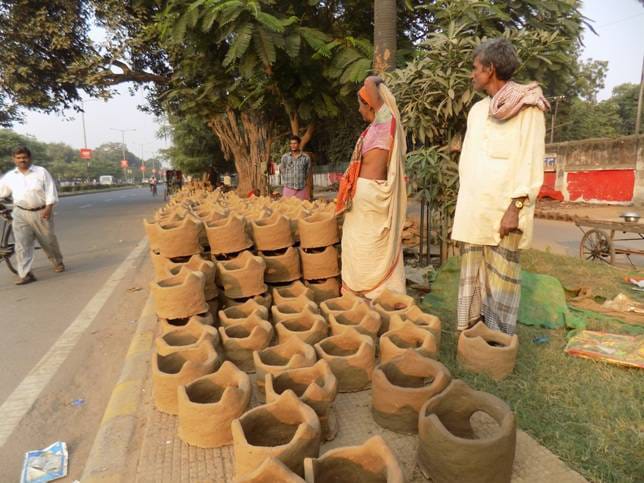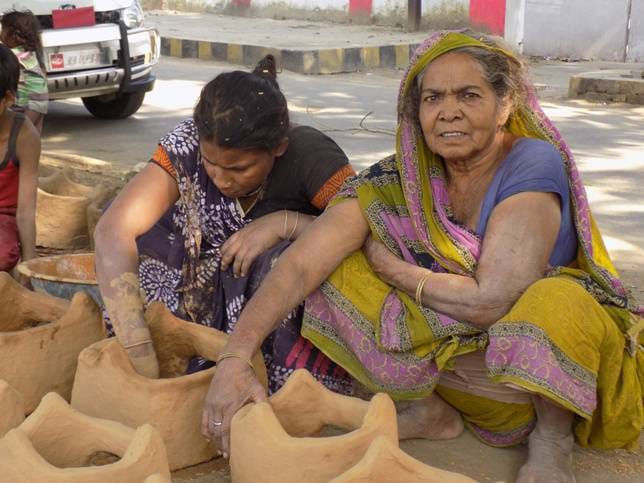Crafting Harmony: Muslim Hands Shape Earthen Stoves for Hindu Devotees in Bihar

M I Khan, TwoCircles.net
Patna: In the heart of the capital city, a heartwarming display of communal harmony unfolds each year as the poorest Muslim women and men craft handmade earthen stoves, locally known as “mitti ka chulha” (earthen stove), for Hindu devotees celebrating Chhath, Bihar’s most revered festival. This humble act of craftsmanship not only supports the ritual needs of the Chhath festival but also serves as a powerful symbol of solidarity, blending faith and tradition across communities.
As the four-day Chhath festival has begun from November 5. The first day of the festival, marked by the ritual of nahai-khai, will be followed by kharna, with devotees preparing offerings for the Sun God.
Alongside the bustling streets of Patna, dozens of Muslim men and women, many from economically disadvantaged backgrounds, set up makeshift stalls to sell these earthen stoves.
For many, the sales have been brisk: some stalls sold out their stock a day before the festival even began.

A Labor of Love and Faith
Mushtaqeema, Ashma, Saheena, Nashreen and Rubina Bano — poverty-stricken Muslim women from various local slums — work tirelessly, crafting each stove by hand. “We begin making these stoves two weeks before Chhath,” says Ashma, a young woman who beams with pride as she describes the care taken to ensure each stove is carefully shaped and sun-dried. “We sell them for Rs 100 to Rs 150 each, and this little income is a blessing. We are happy to help Chhath devotees prepare their offerings,” she adds.
In preparation, these women adhere to strict cleanliness rituals. “We bathe before making the stoves and ensure that no garlic, onions or non-vegetarian food is consumed in the process. It is a mark of respect for the Hindu devotees who will use them,” shares Saheena Khatoon, who, along with her young daughter, sits near the busy Golumber area, a hub for Chhath stove vendors.
Unity in Diversity
While these women may struggle with poverty, their work brings them a sense of fulfillment. “We are proud of the work we do. It is not just a source of income, but a way of contributing to the community and its faith,” says Rubina, a middle-aged woman who has been making and selling earthen stoves for Chhath since childhood. Her stall, set up on the bustling Birchand Patel Marg, is one of many in the area, alongside the party headquarters of the ruling Bharatiya Janata Party (BJP) and Opposition Rashtriya Janata Dal (RJD), as well as the elite New Patna Club.
The stoves are carefully crafted from raw clay, which the women purchase from nearby farmers. They ensure that the stoves are made with purity, keeping in mind that they are used for sacred rituals. “We even observe a vegetarian diet while making the stoves,” Mushtaqeema explains.
Devotees are appreciative of the care that goes into crafting these stoves. Savita Devi, a Chhath devotee, explains, “These earthen stoves are considered pure, and it is a tradition to use them for cooking offerings to the Sun God. We have been buying them from these Muslim women for years, and we do so without bargaining because we respect their dedication to the festival.”
Spirit of Mutual Respect
The relationship between Hindu devotees and Muslim artisans reflects a rare moment of mutual respect and cooperation. Dinesh Kumar, a local businessman, notes the easy availability of handmade stoves in urban areas like Patna, thanks to the Muslim women and men who create them. “We are proud of our shared culture and traditions, in which these stoves play a vital role,” he says.
Even though these Muslim artisans might not be formally educated, their work strengthens the fabric of communal harmony. “Their contribution to Chhath is invaluable. It is a quiet yet profound way of showing solidarity,” says Dinesh, echoing the sentiments of many in the community.
A Tradition of Unity
Despite the challenges they face, these Muslim women and men find their work deeply satisfying. They are well-aware of the significance of their contributions to the Chhath festival, a time when devotion, purity and respect for tradition come to the fore. The earthen stoves are an integral part of the ritual, allowing devotees to cook the special offerings or prasad, for the Sun God.
Interestingly, the sense of shared community extends beyond the making of the stoves. Many Muslims in Bihar also join Hindu volunteers in cleaning up riverbanks and streets ahead of the Chhath celebrations. From Patna to Bhagalpur, Purnea to Gaya, countless Muslims can be found alongside Hindus, working together to prepare the ghats (riverbanks) and other public spaces for the festival. Their efforts, including the donation of money to set up marquees for devotees, reinforce the spirit of unity and cooperation.
A Festival of Faith and Devotion
Chhath is a festival of immense significance, especially in Bihar. Devotees, known as vartis, observe 36-hour fasts and perform intricate rituals at the banks of rivers and ponds, where they offer prayers to the setting and rising sun. The use of handmade earthen stoves is an age-old tradition, and the festival’s importance is reflected in the way entire communities — regardless of religious backgrounds — come together to observe and support it.
The celebration of Chhath also brings Bihari migrants from all over the country and abroad back to their homes. It is a time when families reunite and the entire state is decorated with lights and festive decorations, with folk songs and prayers filling the air.
A Shared Bond of Tradition
The story of the Muslim women and men making and selling earthen stoves for Chhath is a testament to the deep-rooted sense of communal harmony in Bihar. Through their simple yet profound act of craftsmanship, they not only support a key ritual of the festival but also foster an enduring bond between communities, built on respect, faith and shared traditions.
This Chhath, as with many before it, will once again demonstrate that despite differences in faith, the people of Bihar stand united in their devotion to tradition and their commitment to harmony.
